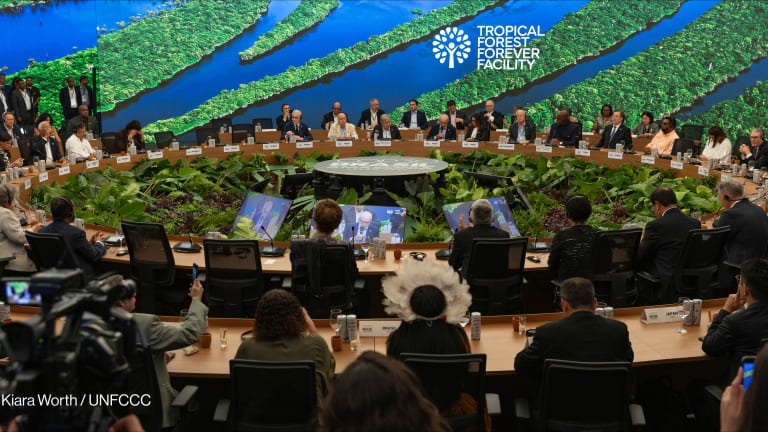
A coalition of several governments and 17 private funders has announced plans to make a five-year, $1.7 billion commitment to directly fund Indigenous and local communities working to protect tropical forests as part of a broad effort to conserve the world’s lands and oceans.
The governments of Germany, the Netherlands, Norway, the United States, and the United Kingdom have signed on to the commitment, which is set to be formally announced Tuesday during the United Nations climate conference in Glasgow, Scotland. A press release referred to it as a "historic" public-private commitment for supporting Indigenous and local communities to protect the forests.
Among the private funders of the pledge are Children’s Investment Fund Foundation, The Christensen Fund, David and Lucile Packard Foundation, Ford Foundation, Good Energies Foundation, Oak Foundation, Sobrato Philanthropies, and William and Flora Hewlett Foundation.
All you need to know from COP 26
To get on-the-ground coverage, in-depth analysis, and behind-the-scenes reporting from COP 26, sign up for our special edition newsletters.
A portion of a $5 billion commitment made by a group grant-making organizations called the Protecting Our Planet Challenge to conserve 30% of the land and 30% of the oceans by 2030 will also be wrapped into the investment. Members of Protecting Our Planet Challenge include Arcadia, a charitable fund of Peter Baldwin and Lisbet Rausing; Bezos Earth Fund; Bloomberg Philanthropies; Gordon and Betty Moore Foundation; Nia Tero; Rainforest Trust; Re:wild; Wyss Foundation; and the Rob and Melani Walton Foundation.
The $1.7 billion investment comes in response to a demand from Indigenous and local communities, as well as civil society groups, for an increase in climate finance that would bolster these communities’ role in protecting biodiversity under customary or collective land rights, which accounts for 80% of all biodiversity on the planet, according to a report by the World Resources Institute.
Yet only about $270 million of climate finance is dedicated to forest protection annually, and just $46 million of that is received directly by Indigenous and local communities, according to information provided by the Ford Foundation.
“We hold the best carbon capture technology our planet has to offer—our forests,” said Tuntiak Katan, a member of the Shuar people from Ecuador and an Indigenous leader representing the Global Alliance of Territorial Communities, in the press release. “The work to protect the planet’s future will only be successful in partnership with Indigenous Peoples and local communities.”
Signatories to the commitment agreed to include Indigenous and local communities in “decision-making and in the design and implementation of relevant programmes and finance instruments,” the press release said. They also agreed to recognize the interests of vulnerable and marginalized groups such as women and girls, people with disabilities, and youths.
This latest pledge follows a trend of increased philanthropic giving for climate change mitigation and conservation over the past year, with additional commitments expected to be announced during the climate conference. Amid this funding wave, experts on climate change philanthropy have cautioned funders against moving forward with projects without exercising due diligence and called for them to ensure projects are inclusive of Indigenous and local communities.
For the Ford Foundation, addressing climate change through the promotion of social justice, Indigenous land rights, and equity was a major motivator for joining the new initiative, Anthony Bebbington, the foundation’s international director for natural resources and climate change, told Devex.
“It’s important to say that recognition of the land rights is essential, but it’s only part of the story,” he said. “What’s also equally essential is that those rights are then protected over time and that the individuals and organizations that are doing that protecting have their human rights protected, have their freedoms protected — freedom from violence, freedom from intimidation, freedom from other forms of aggression.”
A recent report found that 2020 was the deadliest year on record for environmental activists, with 227 documented killings and more believed to have gone unreported. Indigenous people accounted for more than a third of those reported deaths.
Bebbington added that he hoped this might be a “period of inflection” for funders who are hoping to reduce and eradicate deforestation and who are seeking new ways to address the issue after being disappointed by other strategies.
Kevin Currey, a program officer for natural resources and climate change at the Ford Foundation, said it’s critical that conversations about more inclusive funding models are happening, given the potentially significant impact of current deforestation rates.
“Even if we shut off all of the sources of emissions tomorrow, tropical deforestation alone would be enough to take us over the 1.5 degree [Celsius] threshold [for global warming] in the Paris Agreement,” Currey said. “So, it is absolutely critical that in the next 10 years, we bring tropical deforestation down to zero.”








